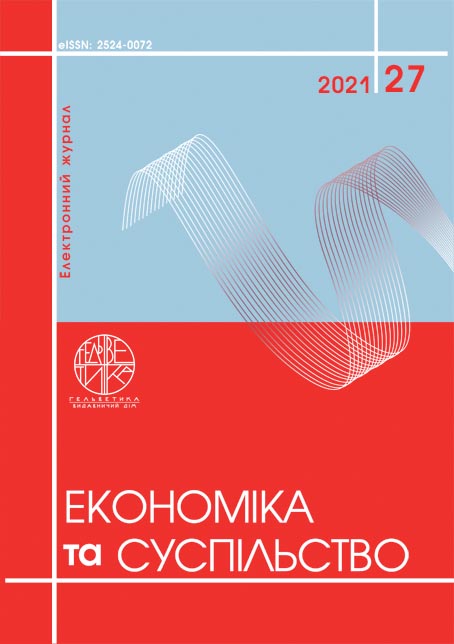MODERNIZATION OF CUSTOMS ACTIVITY WITH THE USE OF INFORMATION TECHNOLOGIES
Abstract
Today, the world economy is characterized by an increase in trade, which requires Ukraine to simplify customs procedures and minimize customs "barriers". The implementation of this requirement is achieved through the introduction of information technology in the processes of customs control and registration of goods and vehicles. The main tasks to be solved at the customs with the help of information technologies are to increase trade and increase passenger traffic across the customs border, reduce time spent on customs control and customs clearance, simplify customs procedures, and create a favorable climate for interstate and business relations. The analysis of world experience has shown that in the developed countries of the world there is a creation of electronic customs with the future transition to digital. At the same time, electronic declaration, introduction of technologies of automatic registration of declarations on goods and "remote release" became the foundation of transformation of customs activity. There are currently various platforms that have been developed to improve the logistics chain based on Blockchain technology. Blockchain can reduce trade finance fraud and potentially lead to huge savings for the private sector. One of the risk management tools is the cargo targeting system (CTS). It allows user countries to collect preliminary information in an electronic cargo declaration and perform risk assessment, profiling and targeting. Customs services around the world are now using non-intrusive inspection technology to increase the efficiency of their inspection capabilities and speed up the clearance process. The introduction of new and improvement of existing information technologies at customs through the further development of the e-Customs system is the main direction of development of customs in Ukraine. To date, the functionality of risk management and customs clearance systems is integrated with the NCTS system and is being tested for interaction with NCTS. The introduction of information technology in the processes of customs control is an urgent task in terms of Ukraine's aspirations for European integration.
References
Воевалко Л. Г., Полухин И. В. Инновационное развитие информатизации таможенных органов. Актуальные проблемы авиации и космонавтики. 2017. Т.3. №13. С. 929–931.
Korea pilots blockchain technology as it prepares for the future. World customs organization news. February 2019. №88. URL: https://mag.wcoomd.org/magazine/wconews-88/korea-pilots-blockchain-technology-as-it-prepares-for-the-future/ (дата звернення: 14.05.2021)
Лузина Т. В., Молчанов Е. А. Регулирование таможенных операций в условиях цифровизации экономики. Бизнес. Образование. Право. 2019. №3 (48). С. 131–139.
Максимов Ю. А., Ворона А. А. Использование цифровых технологий и обеспечение информационной безопасности при взаимодействии таможни и бизнеса как фактор повышения качества таможенных услуг. Ученые записки Международного банковского института. 2018. №4 (26). С. 96–106.
Про схвалення Концепції створення багатофункціональної комплексної системи «Електронна митниця»: Розпорядження Кабінету Міністрів України від 17 вересня 2008 р. № 1236-р. URL: https://zakon.rada.gov.ua/laws/show/1236-2008-%D1%80#Text (дата звернення: 14.05.2021)
Voevalko L. G., Poluhin I. V. (2017) Innovacionnoe razvitie informatizacii tamozhennyh organov [Innovative development of informatization of customs authorities]. Aktual'nye problemy aviacii i kosmonavtiki, Vol.3, no 13, pp. 929–931. (in Russian).
Korea pilots blockchain technology as it prepares for the future. (February 2019). World customs organization news. no 88. Available at: https://mag.wcoomd.org/magazine/wconews-88/korea-pilots-blockchain-technology-as-it-prepares-for-the-future/ (accessed 14 May 2021)
Luzina T. V., Molchanov E. A. (2019) Regulirovanie tamozhennyh operacij v uslovijah cifrovizacii jekonomiki [Regulation of customs operations in the context of the digitalization of the economy]. Biznes. Obrazovanie. Pravo, no 3(48), pp. 131–139 (in Russian).
Maksimov Ju. A., Vorona A. A. (2018) Ispol'zovanie cifrovyh tehnologij i obespechenie informacionnoj bezopasnosti pri vzaimodejstvii tamozhni i biznesa kak faktor povyshenija kachestva tamozhennyh uslug [The use of digital technologies and information security in the interaction of customs and business as a factor in improving the quality of customs services]. Uchenye zapiski Mezhdunarodnogo bankovskogo instituta, no 4 (26), pp. 96–106 in Russian).
Pro skhvalennia Kontseptsii stvorennia bahatofunktsionalnoi kompleksnoi systemy «Elektronna mytnytsia» Rozporiadzhennia Kabinetu Ministriv Ukrainy vid 17.09.08 r. № 1236-r [«On approval of the Concept of creation of multifunctional integrated system «Electronic Customs». The Order of the Cabinet of Ministers of Ukraine]. (2008, September, 17). Available at: http://zakon2.rada.gov.ua/laws/show/1236-2008-р. (accessed 14 May 2021)


